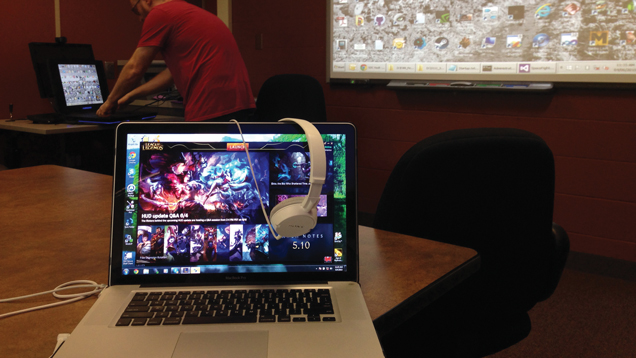Fragging out in class
 CREDIT: CARL GARNICH
CREDIT: CARL GARNICHThere are many distractions that students face in class. Instructors such as Michael Feeney ask that the classroom is a place of learning rather than gaming.
Having Internet accessibility on campus is a crucial resource for students but also a gateway to specific vices such as online video games. With the ability to log into Fanshawe’s
Wi-Fi or accessing connection through Ethernet allows students the potential to game with their friends, but one place growing in popularity is the classroom.
Michael Feeney, program co-ordinator of the game development: advanced programming program, computer programmer analyst program and Internet application and web development program at Fanshawe, said that students have to consider their age and maturity when deciding to use the Internet in class for purposes that are not appropriate to the class.
“This is post-secondary education, these students are adults in every way,” he said. “They pay to be here, they want to be here. Part of what they have to learn is self-discipline. Part of the struggle we have now is constant distraction and we need to fight it.”
Games such as League of Legends and Hearthstone are two games becoming popular among students. Both games are easy to download and play, but require dedication to a specific match until it is finished.
Depending on the gamer, a person can become addicted to the immersion in specific games. In games such as League of Legends and Hearthstone, the player cannot save and pick it up later. Players need to commit to the games in order to be respectful to the other players.
This necessity to commit can cause problems in the classroom because students need to focus on the match to do well for themselves and the team, which can cause a student’s education to take the backseat to the games.
“The question is, ‘Why are they there?’” Feeney said. “They cannot pay attention in class if they are right in the middle of some big multiplayer battle. People think they can multi-task and they can superficially, but not for things that require their absolute attention. If a student tried to play a League of Legends game while listening to the instructor, the student cannot take in everything that is being said.”
Playing in class can create a distracting environment for colleagues, which can affect their education.
“I am not a police officer, I do not need to micromanage them because that also does not teach them to do it themselves,” Feeney said. “My only rule is that if they disturb someone in class or play a game right in the front row, it would be the same as if they were talking. If they are disruptive they need to stop or leave.”
Being an adult does not mean that life has to be all work and no play, but it becomes the responsibility of the student to understand that their future is on the line. Playing games in class could mean failing courses and prolonging graduation, or it could create bad habits in the workplace that could affect the student’s ability to hold down a serious job.
Mixing video games with classes could be a bad combination. So before you log in during class, remember to game responsibly.














